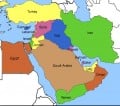Weighing the options of a Syria strike
Just what are the options at the hands of US President Barack Obama for hitting Syria. He seems to be on the road for well and truly striking the country. However, while he initially put on a big show of force, he is now waiting for the vote from the US Congress on 9 September or thereabouts.
Washington seems to be bracing itself for another war in the Middle East, after having been in Iraq since 2003. It seems also that it likes being embroiled in a region that is full of intractability.
The USA is not alone. France is in a robust position to strike at Iraq, so is British Prime Minister David Cameron despite the fact that the British House of Commons voted for a “no vote” on the attack that’s likely to come from whatever form.
French socialist President Francois Hollande is today’s chest-beater, wanting to have a go at the Syrian president Bashar Al Assad. However, like his American counterpart he is playing it coolly, wanting and getting the French thumps up from the French parliament although he doesn’t need to.
Meanwhile Syria is waiting and seeing, eyeing the American the five destroyers from afar with itching trepidation. The timing of the chemical attack on Ghota in Damascus on 21 August, and which started the international outcry, is seen as unfortunate incident which the Baath regime is strenuously denying it had any part in.
The regime’s point out how can we have carried out the chemical attack when UN inspectors were on a 10-day trip to our country, and something which the Syrian government had invited.
However, today everyone is seeking a part in the development in the Fertile Crescent. There is a deadly cycle that’s being split down the middle. The USA, France, Turkey and many Arab countries including Saudi Arabia and Qatar are all saber-rattling.
What is being considered is variety of options which Obama is pointing out falls short of an all-out war on Syria as was the case in the 2003 war on Iraq with the express purpose of regime change. As he and his officials keep pointing out there is not going to be any “boots-on-the ground” but the five destroyers in place, are loaded with tomahawks and carry marines of more than 2000 persons on each.
With the military ships at the Mediterranean, Obama could be keeping his options open, to missile strike as he says but also to give himself the maneuverability for potential military landings.
The moral justification for all this is also being over-played. Not only there is a sense of abhorrence in the tone of Obama but this tone is also coming from the French president. Many are saying there is a cynical view to this as America and the West watched over 100,000 people killed in the Syria war since it started in March 2011 and which resulted in a gushing stream of people leaving to the surrounding countries.
According to UN sources point out there are today 4.5 million displaced refugees inside the country and 2 million living in camps and shelters in Lebanon which has 750,000 refugees, Turkey at 450,000 and Jordan at more than 500 million.
Many inside Syria are afraid of a limited American strike, in fact more so than an all-out strike because they fear that Baath retaliation against them could be extreme once the missiles stop and Obama and the American military decide to call it a day and go home.
Obama’s options today stand complicated by what can only be called the internationalization of the Syria conflict. On one level there are more than 6000 mercenaries from the Arab and European countries fighting in Syria, and supporting different sides, including Jihadists.
Hizbollah has long sent its fighters across the border from Lebanon to support the Baath regime. They represent the Shiite version of Islam and are fighting against the Sunni Jihadists. The fact that many of their fighters in the country, may be positive for Obama administration because what it would mean they would be less likely to throw rockets on Israel in the event of military action, and therefore making an expansion of the strikes into the war less likely.
With Hizbollah on the Syrian ground, Iran, China and Russia, long-time friends of the Baathist regime are also less likely to act because of strategic considerations, and even though they could very well be a series of strikes.
Regardless of the fact that Iran has been a long-time protagonist against the United States and Israel, it does not want to give the latter two any excuse for any confrontation or a conflagration because of the regional balance of power which maybe stacked against them, and given the fact Iran believes in working behind the veil of quiet diplomacy in strengthening itself and creating allies in the region.
This leaves Syria’s other allies, Russia and China, two powers with long-term relations on the political, diplomatic, military and diplomatic levels. Their importance lies in their veto powers on the UN Security Council. However, because strong indications are showing Obama will not heed to the Security Council for a possible hit, the veto powers are likely to be ineffective.
That’s why there are reports Russian ships are too moving in the Mediterranean, no doubt to wait and wait, and see how the conflict develops. Russia has always been a strong supporter of Syria, carefully cultivating it since the days of the Soviet Union in the 1970s and 1980s. It sees Syria as an important area for Moscow to be looking unto the rest of the Middle East and Turkey, and would certainly not wish to see America’s domination of the area increase
However, it is still very difficult to figure out what it will do if American ships start bombarding Syrian targets. Will they act, and how will they act? There is always a possibility of a showdown as history shows in the 1973 Arab-Israeli War or before that in the 1962 Cuban missile crisis when the world held its breath waiting for nuclear confrontation between the superpowers. In the end, both backed off, and the world started breathing again.
Are we likely to see that again? After all, countries are more solidified than ever before with everyone having it in for each other. This is what Obama has to watch out for, even if he gets a yes vote from Congress.








